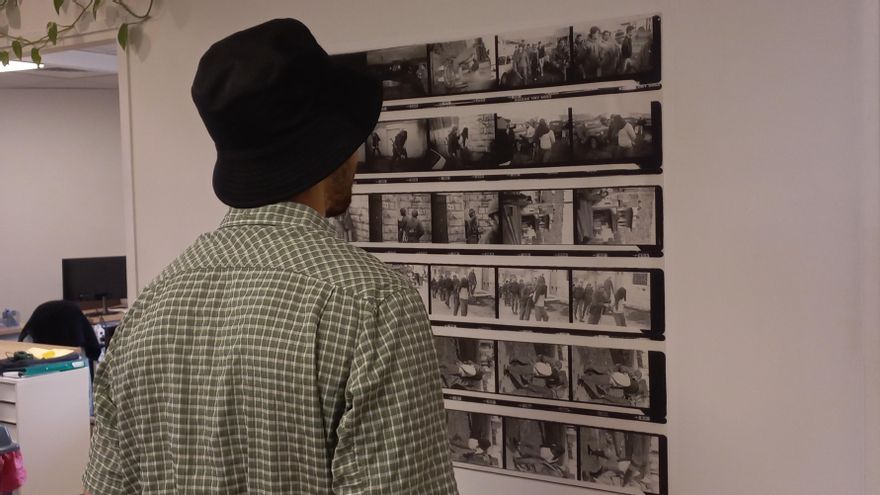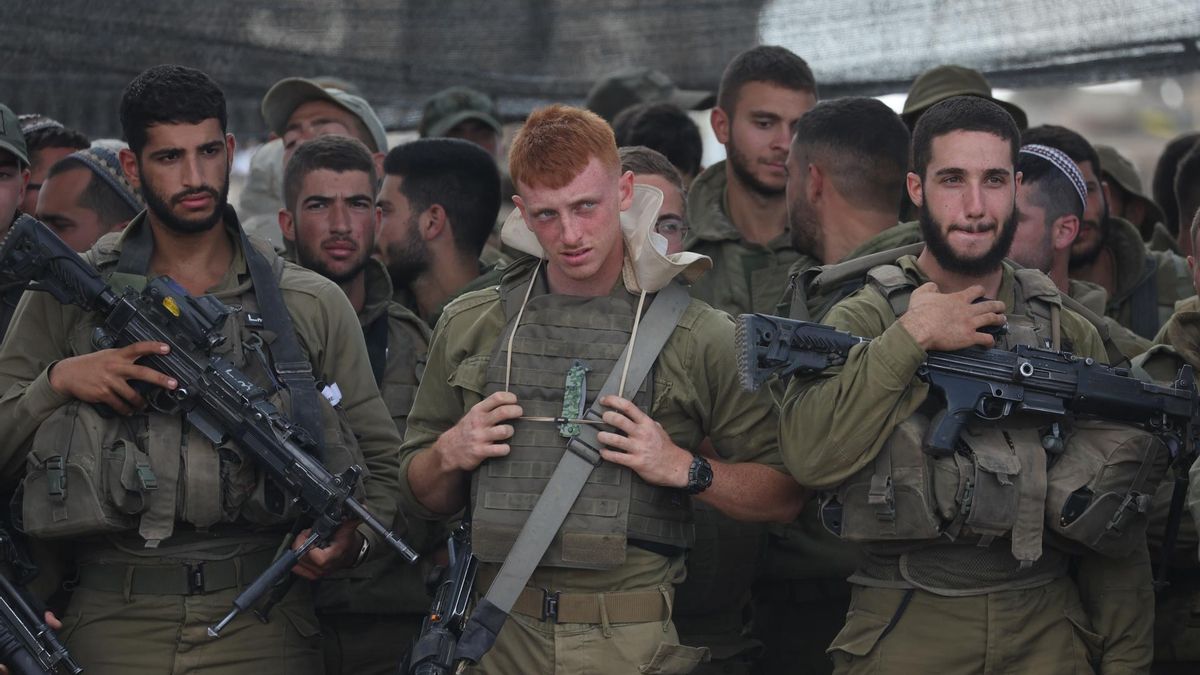“There were no clear rules of engagement with civilians, each soldier decided whether to shoot or not.” This is according to a 23-year-old former Israeli sergeant who served in the Gaza war in an infantry unit. He meets with elDiario.es in Tel Aviv, but asks not to publish his name or personal data that could reveal his identity.
“During my second mission in Yabalia (in the north of the Strip) it was the first time I saw civilians. The first days there were some accidents in which civilians were killed,” he says without specifying the circumstances of those murders. It was a few months later, in the spring of 2024, when he had an encounter with Palestinian civilians that changed his view of the war and ultimately led him to refuse to continue with his unit in Gaza.
“We were stationed in a humanitarian corridor; there were many civilians on the road fleeing Al Shifa Hospital (in Gaza City) and heading south,” just as the Israeli military had ordered them to do.

'Mosquito protocol'
“The first night, the commander told us to take two men off the street to use as human shields in our raids. He used the term 'mosquito protocol'. I heard it on the radio and I didn't understand what that protocol was, it was the first time I had heard it,” says the sergeant, referring to a practice that is prohibited by the rules that govern war.
The commander told us to take two men off the street to use as human shields in our raids.
Former Israeli Army Sergeant
Last May, The Israeli Army said in a statement that he was investigating “several cases” in which his soldiers had forced Palestinians to act as human shields, that is, to enter buildings or places where there could be explosives or Hamas militiamen before the troops. The Army stated that “the use of Palestinians as human shields or coercing them to participate in military operations is strictly prohibited by the orders of the Israel Defense Forces (IDF).”
The former sergeant interviewed by this newspaper and testimonies collected by other means indicate that the practice is common and that Israeli forces have used it during the two-year offensive in Gaza (during which they have killed more than 67,000 Palestinians, most of them minors and women).
“They brought two young people, one of 16 years old and the other of about 20. They were trembling, they were handcuffed and blindfolded. The officer who handed them over to me was the intelligence officer and he told me that I should use them based on the 'mosquito protocol'. He also told me that they were related to Hamas, but I saw that they were just teenagers,” says the former military man with a certain bitterness and shame in his eyes.
It was the first time I was so close to civilians: I could smell them and see how scared they were, it was shocking
Former Israeli Army Sergeant
He explains that the soldiers could not understand what the two boys were saying to them in Arabic. “They asked to go to the bathroom, but they couldn't do it alone because they were handcuffed. I had to take them to the bathroom and open the zipper. I was very close to them and I could see how scared they were. It was the first time I was so close to civilians. When I saw them so close, I could smell them and see how scared they were. It was shocking,” he admits.
“We used them in our raids, when we attacked a couple of buildings. They entered the buildings before us, opened all the doors and windows and looked for explosives and Hamas members who could ambush us; (in that case), they would die in our place,” says the former sergeant, basically explaining what the 'mosquito protocol' consists of.
He and the other members of the platoon refused to continue using the two Palestinians as human shields, he says, although he points out that he does not know if this rejection occurred in other platoons or battalions of the Army. “One of my soldiers told the battalion commander that we were committing war crimes and violating international law. He responded that a soldier does not have to think about international law and should only take into account the IDF code of ethics.” The young man remembers that this response affected him: “At that moment I realized that I was participating in an immoral war.”
One of the soldiers told the commander that we were committing war crimes and violating international law.
Former Israeli Army Sergeant
The former member of the IDF says that they managed to prevail and the commander ordered him to “release” the two kids in the same place where they had been kidnapped. Then, he says he realized that they had nothing to do with Hamas, because if they had, they would have been held longer.
“There are many immoral and wrong things in this war, but the meeting with those two boys was shocking for me and, surely, for them too,” says the former sergeant who, at that time, was almost the same age as the oldest Palestinian.
A war of revenge
Before the offensive against the Gaza Strip, the soldier had served in the occupied West Bank, where most of the troops were deployed in the months leading up to October 2023. “At first, people thought that serving in the Gaza Strip was more moral (than in the West Bank) because there they would face terrorists,” he recalls, adding that after the Hamas attacks against the south of Israel on October 7 two years ago, many uniformed men went to Gaza “with a desire for revenge.”
“Many soldiers were in a state of shock after October 7 and wanted revenge. I did not go with that feeling of revenge; the only thing I thought about was the safety and well-being of my soldiers,” he says.
I was free to do whatever I wanted, I didn't shoot any civilians because I didn't want to.
Former Israeli Army Sergeant
These soldiers with a thirst for revenge, who are often in their 20s, are the ones who decide about the lives of Palestinians in Gaza. “There are no clear rules, we decide. But if I shot a boy or a girl, I think no one would have punished me. I was free to do what I wanted, I didn't shoot any civilian because I didn't want to,” he says.
“During the seven months I served in Gaza, I only saw armed men on four occasions. The rest were unarmed people and I don't think any soldier should shoot someone who is unarmed,” says the former sergeant, highlighting that he was clear about what was “correct” and what was not, but that some soldiers competed to kill more Palestinians. “There is a game among soldiers: the more people you kill, the more X (points) you get.”

From the Israeli organization Breaking the Silence – founded in 2004 by “repentant” soldiers who began to denounce what the army was doing in the occupied Palestinian territories – its director Nadav Weiman affirms that it should be commanders and high-ranking officers who guarantee that soldiers apply orders “without harming civilians, without setting fires or looting the homes” of Palestinians.
“Of course a 19-year-old soldier, whose friends or family were massacred on October 7, is angry and wants revenge. I understand that. But the officers must stop him,” he says in an interview with elDiario.es. However, Weiman says that in this war it is the high-ranking military who incites their subordinates to fight “a sacred war against the infidels” in Gaza.
In the past two years, since the beginning of the brutal offensive against the Strip, Breaking the Silence has collected almost 200 testimonies from military personnel. Weiman explains that before they used to be around 50 testimonies per year, but since October 2023 they have increased considerably. In the past two months alone, the NGO has conducted 33 interviews with soldiers who tell what they have done in the Strip and whose stories are similar to those of the former sergeant interviewed by this newspaper.
Many soldiers, including commanders, want to talk to us so that people in Israel and around the world know what Israeli forces are doing in Gaza
Nadav Weiman
— director de Breaking the Silence
“This shows that the army's conduct in Gaza is very problematic and many soldiers, including commanders, want to talk to us so that people in Israel and around the world know what the Israeli forces are doing in Gaza,” says the director.
Weiman says that if you compare the current war in Gaza with the 2014 Israeli offensive against the Strip, the IDF still has virtually the same commanders, “but they are doped up by the October 7 attacks.” Weiman believes that they seek to demonstrate that they are still the predominant force, after having failed to prevent the Hamas attacks that that day killed some 1,200 people in southern Israel. And they do it by “massacring civilians.”
Army commanders are doped by the October 7 attacks
Nadav Weiman
— director de Breaking the Silence
The director, who once served in the IDF, relates that “soldiers say they can do whatever they want” in Gaza, from taking human shields to ordering a bombardment if they see a silhouette through a window in a building without knowing who is inside. He adds that the rules of engagement for Israeli uniformed personnel have been vague for many years. And they are like that on purpose.
“Of course this is affecting the soldiers,” says Weiman and is corroborated by the former sergeant, who went to therapy for a few months after his experience in Gaza. “Now I want people to know what is happening in Gaza,” says the young man.
“Israel is bombing journalists in Gaza and banning the entry of the international press. The IDF spokesperson is not trustworthy and (people) cannot know the truth” of what is happening in the Strip, he laments, although he admits with some frustration that “most Israelis do not want to know or think about it.”